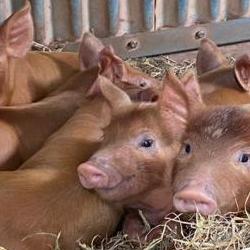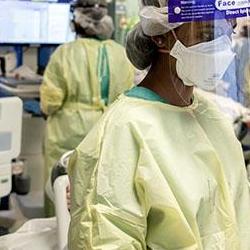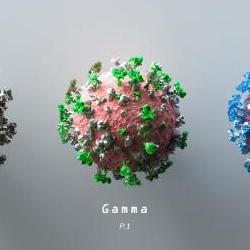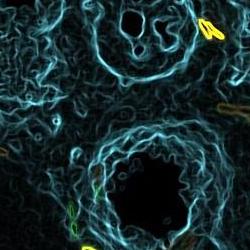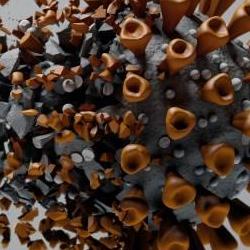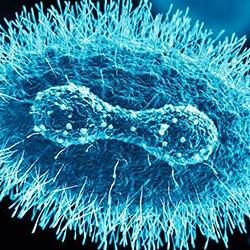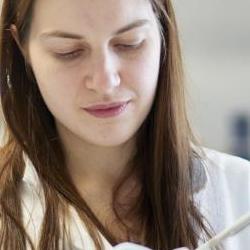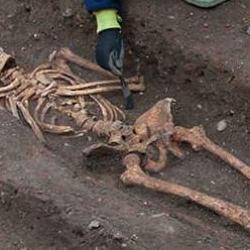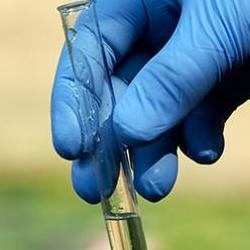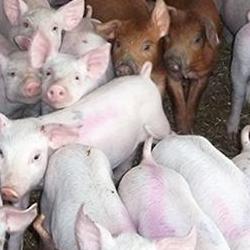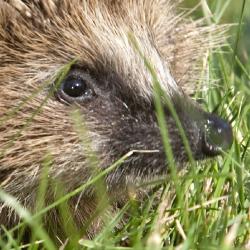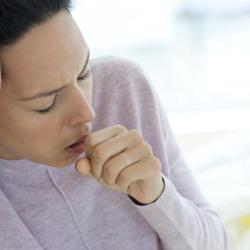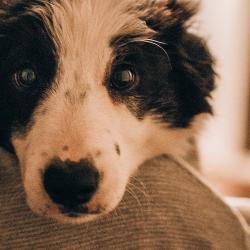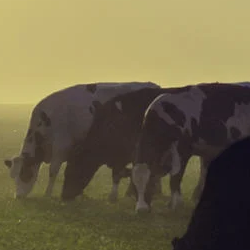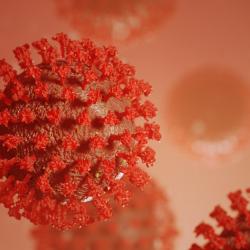New study from the Transmissible Cancer Group reveals evolution of Tasmanian devil cancersTasmanian devils, marsupial carnivores endemic to the Australian island of Tasmania, are susceptible to two transmissible cancers, known as devil facial tumour 1 (DFT1) and devil facial tumour 2 (DFT2). A new study from the Transmissible Cancer Group at the Department of Veterinary Medicine, published in Science, investigated the evolution of DFT1 and DFT2. |
|
New animal welfare scoring system could enable better-informed food and farming choicesCambridge University scientists have come up with a system of measuring animal welfare that enables reliable comparison across different types of pig farming. |
|
Underactive immune response may explain obesity link to COVID-19 severityIndividuals who are obese may be more susceptible to severe COVID-19 because of a poorer inflammatory immune response, say Cambridge scientists. |
|
Virus infection helps make tomato plants more successful fathersDr Alexandra Murphy and her colleagues in the Virology and Molecular Plant Pathology group have discovered that bumblebees can preferentially boost the transfer of male genes in virus-infected tomato plants, which in turn may aid the development of virus-susceptible plant populations. |
|
Roadmap sets out new global strategy for development of more effective coronavirus vaccinesPlan will accelerate a new approach to coronavirus vaccines research and development, to protect against COVID-19 variants and future pandemic threats from new coronaviruses. |
|
Gone fishing: highly accurate test for common respiratory viruses uses DNA as ‘bait’A new test that ‘fishes’ for multiple respiratory viruses at once using single strands of DNA as ‘bait’, and gives highly accurate results in under an hour, has been developed by Cambridge researchers. |
|
The off-patent drug that could protect us from future COVID-19 variants
|
|
“Nature finds a way…” How activation of a hidden pathway can help a respiratory pathogen survive in the infection environmentResearchers at the University of Cambridge and the University of Saarland (Germany) have performed a systemic analysis of the metabolism of Pseudomonas aeruginosa – a WHO “critical priority pathogen” responsible for causing serious airway infections in humans – and have identified an unusual and unexpected mechanism that aids its survival in infected tissues. The finding opens the door towards developing better strategies to fight the pathogen. |
|
Programmable molecular scissors’ could help fight COVID-19 infectionCambridge scientists have used synthetic biology to create artificial enzymes programmed to target the genetic code of SARS-CoV-2 and destroy the virus, an approach that could be used to develop a new generation of antiviral drugs. |
|
Cambridge researchers join new £2 million UK consortium to tackle monkeypox outbreakCambridge is among 12 institutions across the UK that will be working together to tackle the monkeypox outbreak, developing better diagnostic tests, identifying potential therapies and studying vaccine effectiveness and the virus’ spread. |
|
Set up reserve lab capacity now for faster response to next pandemic, say researchersResearchers say a ‘human bottleneck’, due to historical cuts in public health funding, delayed the UK’s scale-up of COVID-19 testing in the early stages of the country’s pandemic response. |
|
Medieval monks were ‘riddled with worms’, study findsResearch examining traces of parasites in the remains of medieval Cambridge residents suggests that local friars were almost twice as likely as ordinary working townspeople to have intestinal worms – despite monasteries of the period having far more sanitary facilities. |
|
Study reveals why highly infectious cholera variant mysteriously died outA new study reveals why a highly infectious variant of the cholera bug, which caused large disease outbreaks in the early 1990s, did not cause the eighth cholera pandemic as feared – but instead unexpectedly disappeared. |
|
Highly antibiotic-resistant strain of MRSA that arose in pigs can jump to humansA new study has found that a highly antibiotic-resistant strain of the superbug MRSA – methicillin resistant Staphylococcus aureus – has emerged in livestock in the last 50 years, probably due to widespread antibiotic use in pig farming. |
|
Superbug MRSA arose in hedgehogs long before clinical use of antibioticsScientists have found evidence that a type of the antibiotic-resistant superbug MRSA arose in nature long before the use of antibiotics in humans and livestock, which has traditionally been blamed for its emergence. |
|
Prehistoric faeces reveal parasites from feasting at StonehengeA new analysis of ancient faeces found at the site of a prehistoric village near Stonehenge has uncovered evidence of the eggs of parasitic worms, suggesting the inhabitants feasted on the internal organs of cattle and fed leftovers to their dogs. |
|
|
|
Effectiveness of antibiotics significantly reduced when multiple bugs presentA study has found that much higher doses of antibiotics are needed to eliminate a bacterial infection of the airways when other microbes are present. It helps explain why respiratory infections often persist in people with lung diseases such as cystic fibrosis despite treatment. |
New grafting technique could combat the disease threatening Cavendish bananasScientists have found a novel way to combine two species of grass-like plant including banana, rice and wheat, using embryonic tissue from their seeds. The technique allows beneficial characteristics, such as disease resistance or stress tolerance, to be added to the plants. |
|
Intensive farming may actually reduce the risk of pandemicsScientists evaluated the evidence that intensive livestock farming is causing pandemics, with surprising results. They found that intensive livestock farming could actually reduce the risk of future pandemics, compared to non-intensive farming. |
|
Genomic study shows that England’s travel quarantine measures were effective – up to a limitFourteen-day quarantine measures imposed on incoming travellers returning to England in summer 2020 helped prevent the spread of the SARS-CoV-2 virus, particularly among 16-20 year olds, say a team led by Cambridge scientists. |
|
Protection of refugee animals is vital to support livelihoods and healthAnimals play a central role in many peoples’ lives, and the lifting of veterinary regulations to allow them to be moved to safety during the current humanitarian crisis in Ukraine is unprecedented. |
|
Safeguarding the wonder drugs: How researchers helped change UK farming practices and reduce the rise of antibiotic resistance in livestock.Research led by Professor Mark Holmes from Cambridge’s Department of Veterinary Medicine has helped to change UK farming practices and reduce the rise of AMR in livestock. Holmes believes that now is the time to stress the positives of good antimicrobial stewardship. |
|
Needle-free vaccine targets COVID-19 variants and future coronavirusesSafety trials are underway for a Cambridge-led vaccine that could be used as a booster targeting COVID-19 virus variants and relatives that threaten future coronavirus pandemics. The first volunteer is expected to receive the vaccine today at the NIHR Southampton Clinical Research Facility. |



